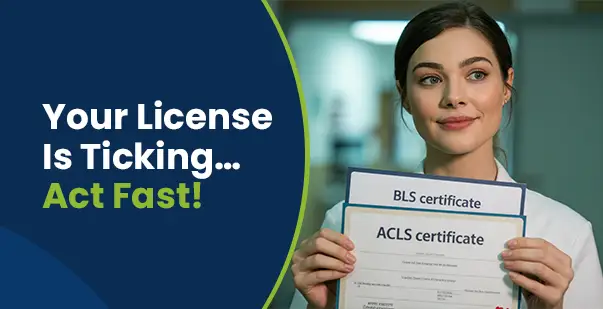Table of Contents:
- Introduction
- Why Timely Renewal Is Important
- How to Renew Your BLS or ACLS Certification
- What’s New in BLS and ACLS for 2025
- 2025 Renewal Checklist: What You Need Before You Re‑Certify
- 5 Reasons You Should Renew Your Certification Early This Year
- Renew Your BLS or ACLS Certification Before It’s Too Late
We’re halfway through 2025, which makes this a good time to pause and check in with your BLS and ACLS certification. If you’re a healthcare professional, ask yourself: Is your Basic Life Support (BLS) or Advanced Cardiac Life Support (ACLS) certification still valid? If you’re unsure or hesitating, you’re not alone. But this is the right time to double-check.
Between July and October, hospitals and clinics usually start reviewing staff credentials. This lines up with audits and hiring cycles. In fact, The Joint Commission’s 2023 Medical Staff Update states that hospitals are required to conduct credentialing of all licensed practitioners at least every 24 months.
Still, many people miss the deadline. Having an up-to-date certification shows you’re prepared to respond in real-time and keep patients safe. If you delay, you risk losing job opportunities, affecting patient care, and even putting your license at risk.
So take a minute today and check your certification status. It’s a small task, but it could save you from major problems later. Let’s look at why mid-year is such a smart time to renew, and how you can stay ahead.
Why Timely Renewal Is Important?
If your BLS or ACLS certification is due to expire soon, don’t wait. Be sure to check your credentials once, mid-year, to ensure you’re still in compliance with workplace and licensure requirements. Letting your certification lapse can have serious consequences. A few of these include:
- Suspension from patient care.
- Missed shifts or job reassignment.
- Loss of employment in hospitals, Emergency Medical Services (EMS), or outpatient settings.
- Increased liability and patient safety risks.
Even if you’re confident in your clinical skills, employers won’t allow you to practice without a valid certification.
How to Renew Your BLS or ACLS Certification
There are three main ways to renew your certification in the U.S., depending on your learning style, time availability, and employer requirements. Here’s a breakdown of each:
1. Online-Only Renewal
This is typically the most flexible option. You complete self-paced learning modules through an online, accredited platform, and in some cases, demonstrate your hands-on skills through a virtual evaluation or video submission. This route is often used by experienced healthcare providers like nurses, EMTs, and physicians who are confident in their skills and need a quick, convenient option.
2. Hybrid Renewal
The hybrid format blends the convenience of online learning with a brief, scheduled in-person session to demonstrate key skills like compressions and defibrillator use. After completing the online portion, you attend a hands-on evaluation at a designated center. This option works well for healthcare workers who want to review material on their own time but still need in-person validation for compliance or confidence.
3. Fully In-Person Instructor-Led Renewal
In this traditional classroom format, you attend a scheduled session where an instructor leads both the coursework and hands-on practice. It’s a good fit for providers whose certifications have lapsed, those unfamiliar with recent guideline updates, or anyone who prefers structured learning and real-time feedback.
What’s New in BLS and ACLS for 2025
The American Heart Association (AHA) continues to evolve its guidelines to reflect new evidence and improve outcomes in real-world emergencies. As of 2025, several updates have been introduced that directly impact how providers deliver both basic and advanced life support.
Major Updated Protocols
- Cardiopulmonary Resuscitation (CPR) Compression Ratio: The core compression-to-ventilation ratio remains 30:2 for single rescuers and 15:2 for two-rescuer pediatric cases, according to PubMed Central. However, greater emphasis is now placed on minimizing pauses and ensuring high-quality compressions with real-time feedback devices, wherever available.
- Airway Management: There’s a renewed focus on avoiding hyperventilation, especially in post-intubation scenarios for ACLS. Updated algorithms now better differentiate when to use supraglottic airways versus endotracheal intubation, depending on provider skill and setting.
- Technology in Resuscitation: AHA now explicitly encourages the use of CPR feedback devices, capnography, and automated rhythm analysis where resources allow. Integration of technology into code responses is no longer optional; it’s part of the new standard.
Changing Learning Formats
Another major shift is in how training is delivered. AHA-approved digital learning and hybrid models are now widely accepted across U.S. hospitals and clinical settings. These formats combine self-paced modules with remote or in-person skills assessments, making recertification more accessible without compromising quality.
Hospitals and EMS systems are increasingly leaning on these flexible formats for both onboarding and renewal, especially as staffing constraints make traditional, full-day classes harder to schedule.
2025 Renewal Checklist: What You Need Before You Re‑Certify
Before you renew your certification, make sure your employer recognizes the training provider and complies with national standards for healthcare resuscitation training. Accepted providers are typically affiliated with reputable national health organizations like ACLS Now, hospital systems, or accredited continuing education platforms.
These programs follow standardized protocols, offer valid certification cards, and are widely accepted across hospitals, clinics, and licensing boards. When in doubt, check with your facility’s compliance or HR department to confirm which providers meet their internal requirements. Other critical components of the checklist include:
- Documentation: Have your current certification card (or expired within the accepted grace period), a valid photo ID, and, in some cases, proof of your last training or employment in a clinical role.
- Timing: Renew at least 60 days before expiration to avoid scheduling delays or compliance issues.
- Cost: Prices vary by provider, location, and course format (online/blended vs. in-person). Discounts may be available for group registrations or renewals.
Pre-Renewal Checklist
- Confirm your current certification’s expiration date.
- Choose a format (online, hybrid, or in-person) based on your needs and employer policies.
- Verify provider accreditation and employer acceptance.
- Gather documentation: photo ID, current/expired certification card, and any additional proof if required.
- Block out time on your calendar for training and the exam.
- Budget for the cost based on your chosen format and location.
5 Reasons You Should Renew Your Certification Early This Year
If your ACLS or BLS certification is set to expire in 2025, don’t wait until the last minute. Here’s why renewing early is the smarter move:
1. Easier Scheduling and Instructor Availability
Early in the year, you’ll find more open slots for both in-person and hybrid sessions. This gives you the flexibility to choose dates and formats that actually work with your clinical schedule.
2. Avoid the Renewal Season Rush (August–October)
Late summer and early fall are peak renewal months, especially for hospital staff and students. That’s when classes fill up fast, waitlists grow, and it becomes harder to find last-minute availability.
3. Stay Ahead of Potential Protocol Changes
The AHA may release new updates or clarifications mid-year. Renewing early helps you stay current before any major changes roll out, so you’re not scrambling to adjust under pressure.
4. Qualify for Leadership Roles and Resume Updates
Many clinical leadership, travel nurse, and preceptor roles require valid, up-to-date certifications. Renewing early lets you update your resume or internal HR profile before those roles open up.
5. Less Stress = Better Exam Performance
Renewing ahead of time gives you space to review materials without rushing. You’re more likely to retain key protocols, pass the assessment on your first attempt, and walk into your renewal confident, not anxious.
Renew Your BLS or ACLS Certification Before It’s Too Late
As we move through the second half of 2025, now is the ideal time to confirm that your BLS or ACLS certification is up to date. Timely renewal protects your ability to practice, strengthens patient safety, and ensures you stay compliant with institutional and licensure standards.
Don’t wait until an audit, job screening, or emergency forces you to take action. Set aside a few minutes today to check your certification status and plan your renewal to save you from unnecessary stress or setbacks later. If your ACLS certification is nearing expiration, explore accredited renewal options now and secure your spot before peak season begins.







